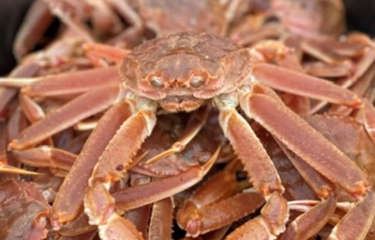Price set for Newfoundland and Labrador snow crab after intense debate

The Newfoundland and Labrador snow crab fishery finally has a set price after a multi-week fight between fish harvesters and processors.
The price for snow crab in Newfoundland and Labrador is set by the three members of the province’s Standing Fish Price-Setting Panel. The snow crab season opened on 4 April, with an increase in total allowable catch of 32 percent.
This year, the panel settled on a base price of CAD 7.60 (USD 6.06, EUR 5.49) per pound for crab with carapaces of four inches in width or greater.
The decision took longer than normal after a contentious debate between the Association of Seafood Producers (ASP) and the Fish, Food & Allied Workers (FFAW) union, with the ASP supporting the CAD 7.60 figure and FFAW pushing for CAD 9.05 (USD 7.22, EUR 6.54) per pound, according to the CBC. The CAD 1.45 (USD 1.15, EUR 1.04) difference in the offers represented the biggest gap between the two price offers in the history of negotiations. The price-setting panel must choose one of the two offers.
The debate was contentious, with hundreds of Newfoundland fishermen traveling to multiple government buildings in the province to protest the price negotiation process, CBC reported.
Following the decision, FFAW union members said they weren’t happy with the price offered by the ASP, and that the process itself is flawed.
"I think we're here to send a loud message. And if people didn't get it in meetings, they're going to damn well get the message today,” FFAW Union President Keith Sullivan said during the protests. “We want some fairness in setting prices. That means real competition. That means transparency in setting prices."
Fishermen in the area argued that the prices being paid in other areas – such as the CAD 12.00 (USD 9.59, EUR 8.74) per pound being paid in Cape Breton – were proof the ASP proposal fell short.
Tensions ramped up when the ASP filed a preliminary motion requesting the recusal or removal of Earle McCurdy, a member of the price-setting panel and a former longtime president of the FFAW. The ASP argued that McCurdy sitting on the panel “gives a rise to a reasonable apprehension of bias towards ASP.” The ASP made the motion, in what the FFAW called a “surprise move,” just days before the panel was required to establish a price.
McCurdy, in turn, refused the recusal, forcing the panel to address the ASP’s motion and delay its price-setting process. The FFAW immediately rebuffed the challenge, calling it a “sickening display of contempt for fish harvesters.”
“This move was clearly premeditated and a deliberate act to undermine the collective-bargaining process on the eve of the snow crab fishery [opening],” the FFAW said. “ASP’s action is raising the alarm for fish harvesters around the province, as union leadership makes plans for critical next steps.”
Sullivan called the move “underhanded.”
“These cartel-like tactics are reminiscent of the merchant era and it makes clear that these companies will do anything to pad their wallets even as we embark on a very valuable snow crab fishery that has been immensely profitable to processors for years,” he said.
ASP’s opposition to McCurdy sitting on the panel began in February 2022, immediately after he was first appointed.
“McCurdy’s appointment is an insult to members, and undermines the independence of the arbitration process. We are going in the wrong direction, and this flies in the face of our calls for a more-professional and -independent arbitration model,” ASP Executive Director Derek Butler said in a release on 14 February.
Butler went on to call McCurdy a “paragon of bias,” based on his history with the FFAW.
“Now the FFAW has essentially got one vote in their pocket on a three-person panel. It is not fair, and it is not right,” Butler said.
In turn, the FFAW submitted its own response to the ASP’s motion, calling it a “constituted collateral attack” on the appointment of McCurdy, asserting he was fully qualified for the position. McCurdy retired from the FFAW in 2014, and currently has no part in the union’s decision-making process.
“The appointment of Earle McCurdy to the price-setting panel is not a conflict of interest. McCurdy, like every appointee, was vetted through the independent appointment system and was appointed to this position by the lieutenant-governor,” Sullivan said. “ASP conveniently seems to forget the appointment of Bill Wells, who worked for years as the executive director of the organization that became ASP and who subsequently served for many years on the panel, including one year as chair.”
Ultimately, the panel rejected the ASP’s motion, concluding there wasn’t enough evidence to constitute a finding of bias. However, the delays meant the panel’s full rationale on its pricing decision will be published after the season has already opened.
“The timing of the preliminary motion and the panel’s need to deal with it to ensure an effective conclusion of the collective-bargaining process under the act resulted in a tight timeframe for the panel to hear and decide the final offers for crab,” the panel said in a statement. “Therefore, the panel is issuing its decision in summary form at this time, and, will issue its detailed report on its decision in the coming days.”
Following the panel’s decision, the FFAW released a statement saying that it plans to “hold off” on seeking a reconsideration of the price amid current market conditions.
“The market is still in decline and a reconsideration may result in a lower price,” the FFAW said. “Historically, this is the lowest point of the market and that it will settle and rebound by the end of April. This will be monitored closely.”
Regardless, the FFAW also said that the organization will continue to put the “maximum pressure” on the provincial government to allow for a second reconsideration, to issue more crab processing licenses to companies independent of the large processors, and to allow outside buyers into the market.
“With outside buyers, the CAD 7.60 price would be the actual minimum and harvesters could seek a better price with multiple buyers,” the FFAW said.
Photo courtesy of Meagan Careen






Share